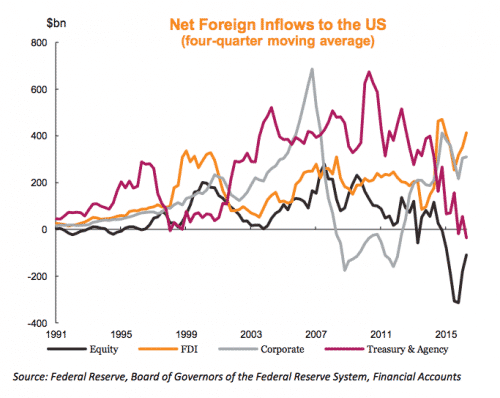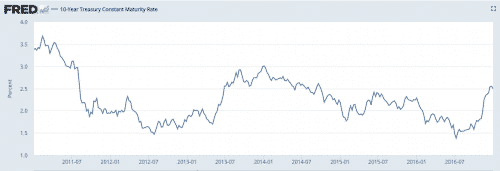There are two things which warrant attention that are empirically wrong with the thesis that Chinese selling of US Treasuries will drive down prices. First, foreigners were net sellers of Treasuries when prices were rising. Second, Chinese selling would be in 2- or 3-year bonds, not at the long end where the selloff in Treasuries is occurring.
First, let’s remember that for years and years, we have been hearing that the bond vigilantes would come after the Japanese and eventually send their yields through the roof. That never happened, instead, yields have plummeted toward zero — even as Japanese government debt ballooned to well over 200% of GDP.
Then we were told, “well, that’s because the Japanese sell all of their government securities domestically, unlike the US. In the US, foreign bond vigilantes could dump Treasuries and yields would skyrocket, sending the US into a recession.” That’s already happened — at least the first part where foreigners ‘went on strike’.
Take a look at the data through 2016

Source: Fulcrum Asset Management
The red line is foreign buying of US Treasury and agency securities. And you can see that level plummeting in the period from 2011 to 2016 (when the US Federal Reserve was engaged in quantitative easing). Meanwhile 10-year yields actually fell nearly a full percent.

Conclusion: Foreigners deserted the US treasury market for a five-year period and rates fell instead of rising. That doesn’t speak to the power of bond vigilantes, does it?
Now that US tax cuts are in the bag, a related question that a lot of serious people are asking is this: “Who Will Buy All the New Treasury Securities?”. That’s how Wells Fargo’s Economics Group put it in November.
Strong demand for U.S. Treasury securities in recent years, coupled with reduced issuance, has kept yields on those securities low. However, the supply-demand dynamics in the Treasury market may be changing. Issuance likely will ramp up significantly in the next two years as the federal deficit widens again. The Federal Reserve is effectively becoming a net seller of Treasury debt as it shrinks its balance sheet, and foreign central banks probably will not purchase as many Treasury bills, notes and bonds as they did during the past decade. If demand for Treasury securities falls short of supply at current prices, then yields will need to rise to clear the market. Indeed, we look for yields on Treasury debt to rise in the next two years.













Leave A Comment